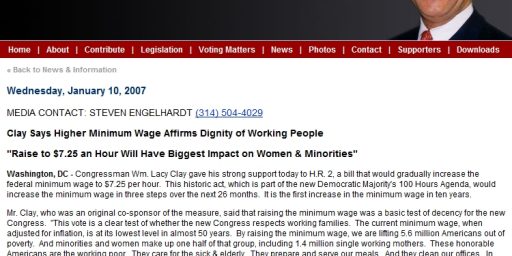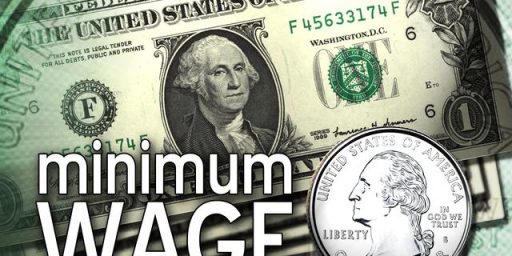Unpaid Interns Exploited?
 Every couple of years, it seems, the news media discover that many companies are using unpaid interns — mostly college students — to do real work. And that this is technically against the law! Well, we’re in such a phase right now and, interestingly, the Obama administration is paying attention.
Every couple of years, it seems, the news media discover that many companies are using unpaid interns — mostly college students — to do real work. And that this is technically against the law! Well, we’re in such a phase right now and, interestingly, the Obama administration is paying attention.
John Stossel weighed in a few days back and, shockingly, wonders what the fuss is all about.
Do you employ unpaid student interns – college students who work in exchange for on-the-job training? If so, President Obama’s Labor Department says that you’re an exploiter. The government says an internship is OK only if it meets six criteria, among them that the employer must get “no immediate advantage” from the intern’s activities. In fact, the employer’s work “may be impeded.”
Impeded? No immediate advantage? I’m in trouble, then. I have an intern at Fox Business News, and I’m getting immediate advantages from her work all the time. I’ve had interns my whole career and gotten lots of immediate advantage from them. Occasionally, I’ve been impeded – but the better interns did the research that made my work possible. I’d asked my TV bosses to pay for research help, but they said, “You think we’re made of money?”
So I asked colleges if students wanted internships. Many did, and from then on I got much of my best help from unpaid college students.
Did I exploit them? Obama’s Labor Department says it’s hired 250 new investigators to catch exploiters like me. I tried to get the department to answer my questions, but it declined.
So I spoke with Village Voice writer Anya Kamenetz, who wrote a column titled “Take This Internship and Shove It” in The New York Times. “We have minimum wage laws in this country for a very good reason,” she replied. “We had them to avoid exploitation like child labor.
But what’s wrong with a free internship if a student learns something about the career he wants to pursue? I was a little stunned by Kamenetz’s answer: “Employers could say we cannot afford to pay anybody, so why should we be forced to pay the guy who cleans the floors?” Because they wouldn’t get people to clean floors if they didn’t pay. But I guess I shouldn’t expect a New York writer to understand markets.
“Interns are people that come in and work for below minimum wage,” she said. “They pull the bottom out of the labor market, and it’s less fair for everybody.”
So it should be banned?
“There are a lot of ways to fill in the need for interns and the need for college students to get experience. One way is for colleges to pay stipends.” But they won’t. “They will if the law is enforced. Another way is for companies to hire students that are eligible for federal work-study.” Oh, I see. The taxpayers should pay for my interns.
“Nobody is saying that these interns should go away,” Kamenetz added. “What they’re saying is a company should put money in their budgets to pay people the minimum wage to work for them, and that is just the basic issue of fairness. If you start working for free, where’s it going to end?”
Give me a break. It would end when the interns have the skills to earn market salaries. Minimum-wage law and union rules already killed off apprentice jobs on construction sites. Contractors say: If I must pay high union wages, I’ll hire experienced workers. I’d lose money if I hired a kid and helped him learn on the job.
My interns often told me that working – unpaid – at WCBS or ABC was the best learning experience of their lives: “I learned more from you than at college, and I didn’t have to pay tuition!” It was good for them and good for me.
Now, it won’t surprise regular readers to learn, I happen to agree. But Stossel’s argument, fundamentally, isn’t about internships at all but rather about minimum wage laws. He’s arguing that adults should be able to work for whatever wage — including no wage at all — that they can get and decide for themselves whether it’s worth it. And, again, I happen to agree.
But the rationale behind the longstanding but largely unenforced law regarding internships makes sense: We have minimum wage laws. We’re making an exception to those laws for very narrow educational purposes and want to ensure that it’s not exploited.
Obviously, no one would sign up for an unpaid janitorial internship. It’s not exactly an upwardly mobile career. But they might sign up for a $2/hour “internship” if employers offered one and they couldn’t find an opening at a higher wage. And allowing that would circumvent the whole idea behind having a minimum wage.
I work for an educational nonprofit and we would have to drastically change how we operate if we couldn’t supplement our staff with a cadre of unpaid interns. We do provide legitimate educational value to our interns but they certainly provide immediate benefit to us as well. But our non-profit status makes us exempt from the laws in question.
One could argue, though, that news organizations — which are mostly for-profit businesses under the tax codes if decidedly non-profitable in practice — are in the same boat. After all, a young college student seeking to work in the media, especially for a libertarian magazine, would benefit greatly from the experience, connections, and resume entry gained by working for John Stossel for a few months. But, then, so could a recent J-school graduate looking for an entry level, paid position.
Again, my preference would be to let the market sort this out. But it’s not without cost.
My real problem with unpaid internships is not the one the law in question is designed to solve. The fact that unpaid internships are the primary means of entry into the media, the nonprofit sector, and the Fortune 500 gives a decided advantage to those who can afford to not only work several months without pay but travel to a big city and pay their own way. It would never have occurred to me, back when I was a college student, to fly to New York or DC to live for several months. We didn’t have the money. (Nor, frankly, did I really have the awareness that this was the route to take.) I spent my summers and weekends trying to make money to pay for my education.
Now, philosophically, I don’t think it’s the government’s job to correct such inequities. But let’s not pretend they don’t exist.






If there are no complaints from the interns, I don’t know why the government has to get involved. Oh yeah, the government has to be involved in every aspect of our lives. I forgot.
But we’ve had minimum wage laws for decades. We should either enforce them or scrap them.
The US government uses unpaid interns all the time!
In State, we’d get applications from dozens of would-be interns applying for a half-dozen jobs, eager and willing to work at US Embassies abroad. They would have to pay for their transportation and all expenses. The Embassy would, if possible, provide housing, though that often meant several interns sharing accommodations.
The interns were responsible for their own health insurance, too, though State would make State MED services available if needed and not too difficult.
Interns would generally get access (through DOD largess) to the APO/FPO and PX, if one was available, but that was not guaranteed.
The interns certainly got experience. The offices that employed them got some help doing routine sorts of things during summers when officers were rotating to new jobs or on leave. The interns also got letters of recommendation: that was their pay.
Now you are starting to sound like Al Sharpton! Inequities exist everywhere, that’s why penis enlargement devices sell so well on the internet.
And how is it that the sexual practices of two consenting adults is not any business of the government yet a business arrangement of two consenting adults is subject to harsh scrutiny?
The biggest effect of minimum wage laws has been to greatly reduce the amount of jobs available to unskilled workers, teens in particular. Go ask an unemployed teen, who still lives with his parents, if he/she would prefer an unpaid internship to learn valuable job skills or remain unemployed.
I think internships are a great way for people to get experience.
I figure as long as the intern is willing to work for the wage provided (free or otherwise) and both the intern and the employer benefit, then it should be allowed. An intern working for free isn’t under any obligation to continue to work, if the employer is abusing their position-shoot the intern working for free doesn’t even have to worry about medical insurance or paying the bills since the internship contributed to neither.
I had an internship in grad school that did come with a stipend, but it gave me far more knowledge of the inner workings of my career choice than anything I was told in a college classroom.
If these businesses didn’t have unpaid interns, would they hire young people instead?
If the answer is yes, then I would say it is exploitation. If the answer is no, then no harm.
John Burgess, what was the socio-economic profile of a typical State Dept. unpaid intern? James’ concern about unpaid internships providing special access to the sons and daughter of privilege would be especially sensitive in government.
The government is participating in this practice …. Congressional “interns” — often the object of sexual predators — ARE NOT PAID!
If Congress has a problem with this practice, let them “clean house first” … or to be more precise clean “the House” first!
This is my problem with it too. I did an unpaid internship with a number of other students, but whereas some of them could keep going for a full year or longer, me and a couple of other interns had to call it quits after about 4-5 months.
Why? Because of money issues. I didn’t get much in the way of financial help from my parents (not from lack of desire on their part, but from lack of ability to help – we didn’t have a lot of money growing up), and the internship was taking up most of my time betweens classes, cutting me off from most job options.
PD Shaw: In my 25 years experience, there was no identifiable favoritism in the program beyond the obvious: someone needed to pay the expenses of getting to whatever post and collateral costs. If a student or grad couldn’t pony up the front-end money, there wasn’t much point in taking it further as State (or USIA) had no funds or authority to hire on any basis.
I had interns from all sorts of universities from all around the country, some Ivy League, some schools I’d never heard of. Hiring was based on written submissions (interviews in the field being impractical).
Usually, a CV and grades were provided, but the determinative factor was the essay about what the would-be intern was expecting and how s/he intended to use the experience gained. Flexibility regarding the ultimate assignment was a good sign. An intended intern could ask for placement in a particular office, but was given no guarantee. The different offices would consider the applications and see if there was a natural match between what was needed and what was on offer.
Words that indicated the person knew something about the country were viewed favorably. Intimations that s/he was considering a career in the Foreign Service was a strong plus, of course.
My real problem with unpaid internships is not the one the law in question is designed to solve. The fact that unpaid internships are the primary means of entry into the media, the nonprofit sector, and the Fortune 500 gives a decided advantage to those who can afford to not only work several months without pay but travel to a big city and pay their own way. It would never have occurred to me, back when I was a college student, to fly to New York or DC to live for several months. We didn’t have the money. (Nor, frankly, did I really have the awareness that this was the route to take.) I spent my summers and weekends trying to make money to pay for my education.
Bingo.
This issue presents a tough philosophical quandary for me. On the one hand I oppose the government micromanaging the labor market to the extent they do and don’t think that they should increase their oversight and punishment role. On the other hand I believe in a society which uses its laws to create as much equal opportunity as possible and internships work against that goal because they open doors for those who have parents who can support them and they close doors for those who deep-pocketed parents. If experience in a field is crucial to make entry into the field and the only way to get that experience is through an internship then that effectively closes the door to some people, not because of their lack of desire or lack of ability, but due to their parent’s financial limitations.
In the end, after balancing both concerns, I actually find myself agreeing with the Obama vision and against the Stossel and Joyner vision.